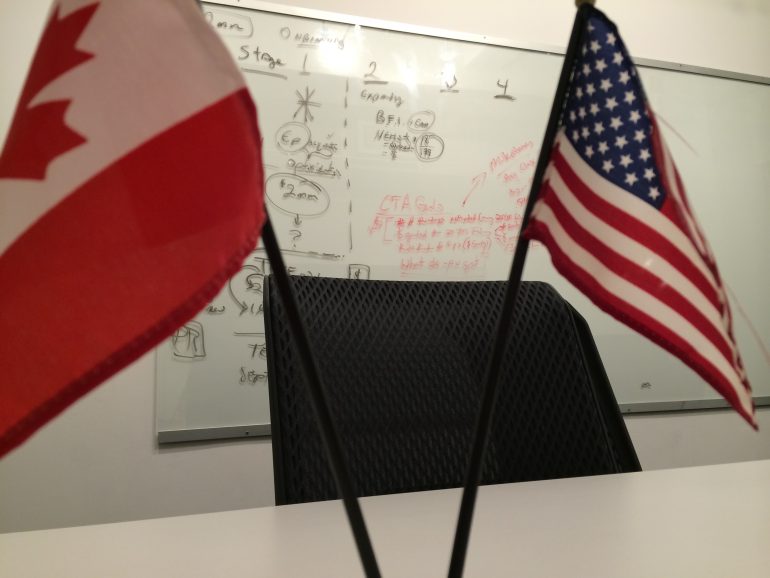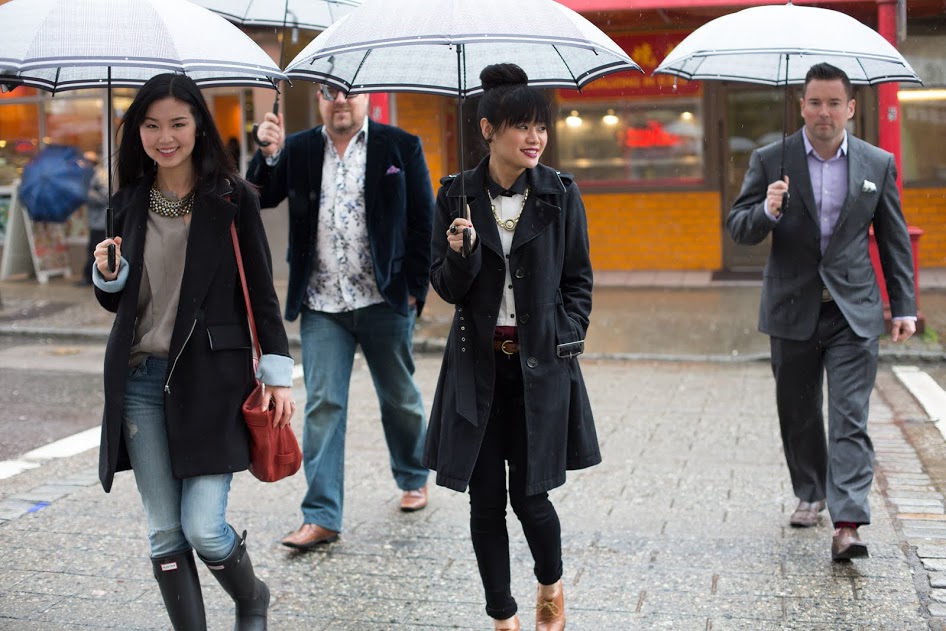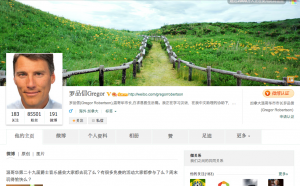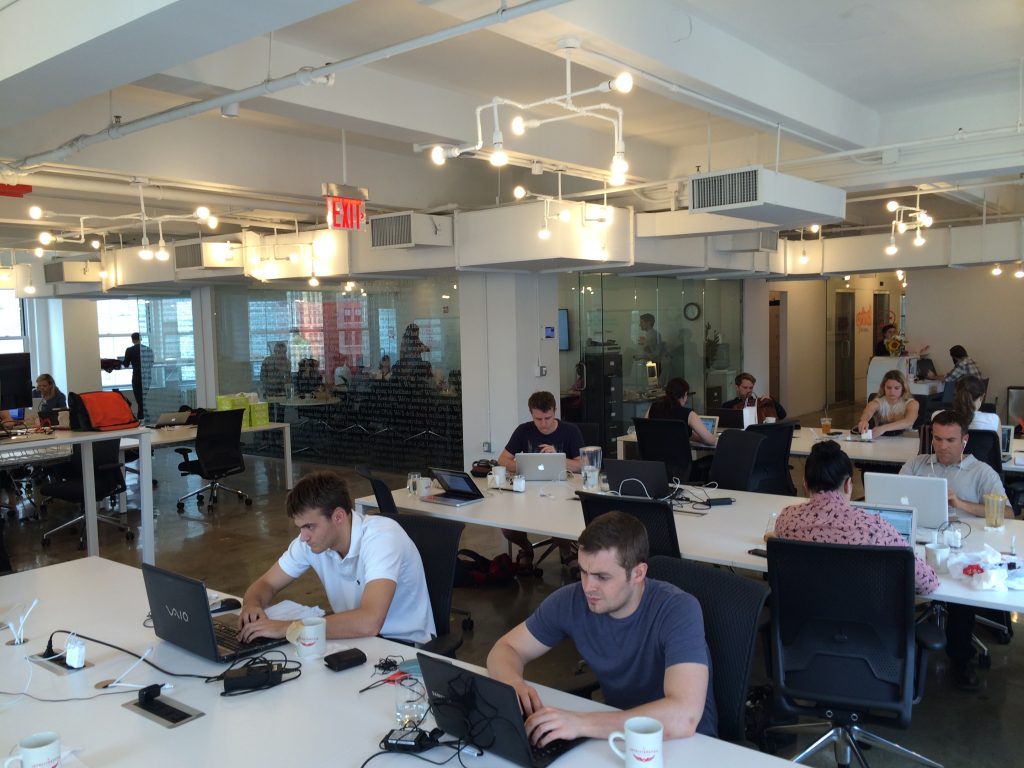“I thought I might relax a bit in New York and be a bit more creative, but that hasn’t happened,” 6S Marketing cofounder Chris Breikss told me as we chatted at the swanky Grind coworking space, which overlooks 39th and Broadway streets in Manhattan.
Grind is home to the Canadian Technology Accelerator’s New York City branch (it has another branch in San Francisco), as well as many other startups and freelance entrepreneurs. The space occupies the 22nd floor one of the endless amounts of tall buildings in midtown, and is a temporary home to several Canadian startups who applied and were selected for the program.
Like Breikss, Canuck companies apply for the program to get a leg up in the US and New York markets, which is particularly helpful for those in the digital media space or ecommerce spaces.
The Consulate General in New York established a Canadian Technology Accelerator in New York City in 2012, giving selected companies four months of free office space at Grind, along with mentorship and entry into the New York community through events. About 50 companies have been accelerated through the program now. The last time we checked in with the CTA @ NYC was when Montreal’s Now In Store updated us on some impressive progress since moving to the Big Apple.
Breikss, the founder of 6S, a Vancouver-based marketing company that now employs over 30 people, thought a stint at Grind would allow him to look at his business through a different lens. It didn’t happen that way.
“I hit the ground running with both feet and business is already happening. We’re pitching more business in the first month that we thought we would in the first year. With what we have on board we would hit our initial targets maybe in the first three months,” he said. “And that’s being conservative.”
Breikss is at the CTA @ NYC because 6S decided to both expand their product offering and their geographic reach. They opened new offices in Toronto and Melbourne, while the cofounder is initially taking on New York solo. It all surrounds a spin-off marketing company they’ve created called Sheng Li Digital (Sheng Li translates to “victory” in Mandarin). As implied in the name, this new company targets North American brands primarily targeting the Chinese market, and need help doing it. They actually started helping brands with Chinese marketing five years ago, but recently decided to devote more resources based on the work of Amy Bao, now the lead project manager of Sheng Li’s team.
There exists over 100 cities in China with over a million people, said Briekss. “Essentially, China is a massive market.” It’s a unique one at that as well.
Sheng Li calls some of the challenges surrounding the Chinese market the “Galapagos effect.” Several species of bird can only survive in the Galapagos islands. Likewise, China’s technology scene is similar in the sense that the products and platforms are unique to China, fostered by China’s culture and “unique” policies as they pertain to the Internet. It all means it’s tough for a Western brand to come in and gain success.
Sheng Li offers marketing consulting, designing strategic campaigns that appeal to a Chinese audience. It’s a bit more than just taking ones splash page and translating the content using Google Translate (that doesn’t really work). Moreover, it can launch Chinese online ad campaigns, set up accounts and infrastructure and run community management on social media accounts.
China is a country full of Internet addicts, despite its government’s best efforts to dissuade such behaviour (Facebook is blocked). Over 618 million Internet users and over 500 million mobile users combined to make over $177 billion in mobile payments last year.
In place of such things as Facebook are massively successful social media sites like Youku (like Youtube), Taobao and Alibaba (eBay and Amazon), Baidu (Google) and Tencent and Weibo (Facebook and Twitter). In fact, Vancouver’s mayor Gregor Robertson has more followers on Weibo than on Twitter (about 85,000 compared to 43,000). WeChat, the Chinese equivalent of What’s App, is said to be valued at over $60 billion, three times as much as Facebook’s recent acquisition price for What’s App.
Add on the fact that there’s two languages in Mandarin and Cantonese, spoken by 959 million and 59 million, respectively, and company’s have immediate challenges.
Sheng Li sports a fully bilingual team (a pretty big advantage, said Breikks), and a small but impressive roster of clients under its belt, including the W Residences in Hollywood, HSBC bank and Cirque du Soleil.
It’s plan is to set up ad technology to facilitate realtime bidding (RTB) and programatic buying and even to set up a trading desk, however it would have to raise about $1.5 million to launch a proper solution.
To aggressively enter the Chinese market, Briekss figures that a brand needs about $50,000 minimum, while $10,000 can be spent on a test campaign.
Meanwhile, his experience at the CTA has been going pretty well. He’s been in the city for a month and figures he’s met at least 100 new people within the tech scene, and those connections have all come from his time at the CTA’s space. “People have been supportive, willing to meet and it has been remarkable,” Breikss told BetaKit. “With the CTA I’ve been able to come into this grind environemtna dn have other startups provide mentorships, introductions, there’s a bit of a safety net there because theres other people there who have had similar challenges.”
He certainly has to produce too: an E1 treaty trader visa means he can work in New York and will be evaluated based on the number of jobs he creates in both countries. He and his wife both moved to the city after selling off most of their stuff, and Breikss has committed to Sheng Li’s “American dream”. “Beyond that we’re not sure and it really depends on whether the business can be successful in this market,” he said.
As he left our meeting it looked like he wasn’t doing bad for himself. His next meeting was with a client that, if he closes on, will mean that Sheng Li will have met its annual target in 30 days, “which would be insanity.”
As he said, the CTA is designed to get companies to hit their goals faster than they predicted.





